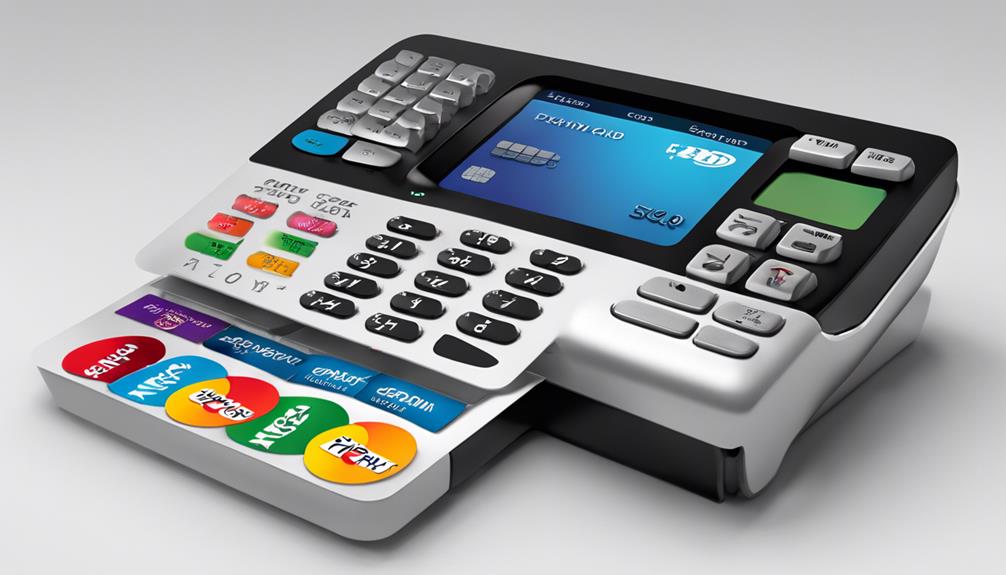Cloud-based POS systems are transforming how you run your business by offering real-time data access, remote management, and enhanced flexibility. With features like inventory control, workforce management, and customer insights, these solutions help you make faster, smarter decisions from anywhere. As more businesses adopt cloud POS for its efficiency and scalability, you’ll stay ahead by leveraging the latest technology. Keep exploring to discover how these systems can elevate your operations even further.
Key Takeaways
- Cloud POS systems offer real-time data access, enabling faster decision-making and improved operational efficiency.
- The rapid market growth and adoption of cloud features indicate a shift from traditional to cloud-based POS solutions.
- Cloud POS enhances flexibility, allowing management of multiple locations remotely and access from any internet-connected device.
- Advanced analytics and business intelligence in cloud systems help optimize inventory, staffing, and marketing strategies.
- The scalability and integration capabilities of cloud POS make it a future-proof solution for evolving business needs.

Cloud-based POS systems are rapidly transforming the retail and hospitality industries, offering businesses greater flexibility, efficiency, and scalability. As you look to modernize your operations, adopting cloud POS solutions can provide immediate benefits. The global market for these systems was valued at USD 6.19 billion in 2024 and is expected to reach USD 7.73 billion by 2025. By 2033, it could grow to USD 45.20 billion, with a compound annual growth rate of 24.7%. This rapid expansion reflects a shift away from legacy systems toward cloud solutions, driven by cost savings and operational efficiencies. Cloud-based POS now accounts for a significant share of the overall POS software market, which is projected to hit USD 32.1 billion by 2026, with cloud solutions increasing their market share annually.
Cloud-based POS systems are revolutionizing retail and hospitality with rapid growth and increasing market share.
You’ll find that the most widely adopted feature of cloud POS is workforce management, with around 67% of users migrating to these platforms. Business intelligence and enterprise reporting follow closely, with 43% and 41% adoption rates, respectively. Other functions like inventory, task, order, and pricing management are also increasingly moving to the cloud, with adoption rates ranging from 33% to 63%. Customer relationship management (CRM) systems are also gaining ground, with 44% of businesses already using or planning to adopt cloud-based CRM. Even functions like loss prevention and return processing are seeing growing interest in migration, signaling a broader trend toward integrated cloud solutions. Embracing cloud technology allows for easier integration of various business functions, further enhancing operational efficiency.
One of the key advantages you’ll notice is the accessibility cloud POS provides. You can manage and monitor your business from any location, using internet-connected devices. This remote access allows you to make real-time adjustments to menus, pricing, and inventory without being physically present. Mobile apps and web dashboards reduce downtime and speed up decision-making, giving you the flexibility to oversee multiple locations from a single platform. This empowerment of remote management not only saves hours weekly but also allows you to focus on strategic growth initiatives.
Real-time data and analytics are at the core of cloud POS benefits. You receive instant updates on sales, inventory, and customer behavior, enabling proactive inventory management through low-stock alerts and demand forecasting. Tracking sales in real time helps you optimize staffing levels and reduce wait times during busy periods. The data insights support targeted marketing efforts and personalized customer experiences, ultimately boosting revenue. Additionally, analytics help minimize waste and improve order accuracy, increasing operational efficiency.
Frequently Asked Questions
How Secure Are Cloud-Based POS Systems Against Cyber Threats?
You might wonder how secure cloud-based POS systems are against cyber threats. Their security depends on your practices and the shared responsibility model. Cloud providers secure infrastructure, but you’re responsible for proper configurations, strong access controls, and encryption. Misconfigurations are a major risk, so implementing multifactor authentication and monitoring helps. Using reputable providers and staying vigilant guarantees your system remains protected against cybercriminals targeting vulnerabilities.
Can Small Businesses Afford Cloud POS Solutions Long-Term?
Think of cloud POS solutions as a steady stream that keeps flowing, making long-term affordability within your reach. You can start small with low initial costs and manageable monthly fees, like dipping your toes into a pond. As your business grows, the system scales smoothly, much like a tree expanding its branches. This flexibility helps you avoid financial storms, ensuring your investment continues to serve your needs without draining your resources.
What Are the Common Challenges When Switching to Cloud POS?
When switching to a cloud POS, you face several common challenges. You need a reliable internet connection, and outages can disrupt sales. Security risks require robust measures to protect sensitive data. Integration with existing systems can be complex, needing careful planning and testing. Staff training is essential to guarantee smooth adoption, and vendor support helps resolve issues quickly. Managing these hurdles effectively guarantees a successful shift to cloud-based POS.
How Do Cloud POS Systems Integrate With Existing Business Software?
Did you know 85% of retailers now use integrated systems? Cloud POS systems connect easily with your existing business software through APIs, allowing seamless data sharing with ERP, CRM, and eCommerce platforms. You can synchronize inventory, sales, and customer info in real time, reducing errors and manual work. Plus, automatic updates and remote management keep everything secure and current, helping your business run smoothly across all channels.
What Is the Typical Downtime Risk for Cloud-Based POS Platforms?
You might wonder about the downtime risk for cloud-based POS systems. Generally, these platforms have a very low risk, thanks to their redundancy, failover mechanisms, and automated updates. Major providers boast 99.9%+ uptime, meaning outages are rare. Even if connectivity drops, offline modes keep transactions running smoothly, and quick recovery minimizes disruptions. Overall, cloud POS systems are reliable, reducing the chances of costly downtime for your business.
Conclusion
As you embrace cloud-based POS systems, you’re stepping into a future where flexibility and innovation shine like a guiding star. Just as the cloud symbolizes limitless possibilities, your business gains the agility to adapt and grow effortlessly. Let this digital sky lift you above traditional limits, opening new horizons. By choosing the cloud, you’re not just keeping up—you’re soaring toward a brighter, more connected tomorrow. The future is in your hands; the cloud is your compass.









